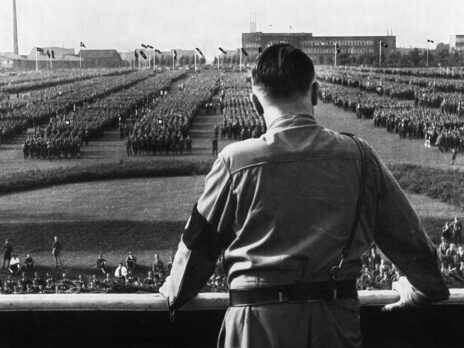Xi Jinping was born into the Chinese Communist Party (CCP) equivalent of royalty. As the son of Xi Zhongxun, one of the first generation of CCP revolutionaries, he was educated at a prestigious boarding school in Beijing where he underwent military training intended to inspire the offspring of high-ranking cadres “to give their lives to the desire to struggle”, and read books such as Be a Successor to the Revolution. But the future Chinese leader’s real political education began at the age of nine, when his father was purged from the party elite by Mao Zedong in 1962, and the Xi family was plunged into the violence and chaos of the Cultural Revolution.
The elder Xi’s downfall was triggered by his decision to support, albeit reluctantly, the publication of a novel about the life of Liu Zhidan, his former comrade and mentor, which was held to contradict the party’s version of history. This might sound like a trivial matter, but as Joseph Torigian explains in The Party’s Interests Come First, the first English-language biography of Xi Zhongxun, the past was a “battlefield” for the CCP. Xi’s political rivals seized the opportunity to move against the then vice premier and Mao agreed that he was guilty of “anti-party activities”. During the years that followed, what had started as an attack on Xi transformed into a “full-scale assault on cadres from the north-west”, writes Torigian, with an estimated 20,000 people targeted as part of the “Xi Zhongxun anti-party clique”, of whom at least 200 were “beaten to death, driven mad, or seriously injured”. Xi later described his disorientation at being persecuted by the organisation to which he had previously devoted his life as feeling like “a person who fell off an 18-floor building”.
When the Cultural Revolution ignited four years later in 1966, as Mao exhorted his zealous young followers – the Red Guards – to tear down what he saw as the remaining institutional resistance to his great revolution, Xi was targeted as a “class enemy”. He was kidnapped by a group of Red Guards from the mining-tool factory where he had been working – he had requested the opportunity to “transform myself into a new ordinary labourer in the style of Mao Zedong” while the Liu Zhidan case was being investigated – and subjected to repeated “struggle” sessions. These included being forced to stand on stage with his head bowed and his body bent over in the “jet-plane” position, with his arms twisted behind him, as the crowd screamed abuse and sometimes kicked and punched him as a purported “counter-revolutionary”. He was held in various forms of confinement and not permitted to see his family for the next eight years.
The supposed sins of the father were also visited on his children. One of his daughters, Xi Heping, hanged herself during the campaign after apparently being “persecuted to death”. Xi Jinping, who was 13 at the start of the Cultural Revolution, was derided as “a bastard” and a “reactionary” by fellow students. In the spring of 1967, he was denounced at a mass rally in Beijing, where he stood on the stage in front of the jeering crowd, a slightly built teenager alongside a group of adults. “Because of his young age, Jinping had trouble with the humiliating heavy steel cap they were all forced to put on their heads as part of the spectacle,” Torigian writes. “He had to hold it onto his head with his hands.”
Xi Jinping’s mother was in the crowd, standing just a few feet from her son during the ordeal. “When the slogan ‘Down with Xi Jinping’ was shouted, she too raised her hands and yelled along with everyone else,” apparently afraid that she, too, would be arrested and taken away from her remaining children if she was deemed insufficiently loyal. When he turned up on her doorstep one rainy night begging for food, having managed to run away from the school where he was being held, she sent him away and then personally reported him to the authorities. In January 1969, at the age of 15, he joined the millions of other “sent-down” youths who were dispatched to the countryside to learn from the peasants during the Cultural Revolution. He boarded the train in Beijing carrying a “bag knit by his mother bearing the words ‘Mother’s heart’”.
Yet these experiences did not prompt either father or son to turn away from the party. After Mao died in 1976 and the worst excesses of the campaign were formally pinned on the Gang of Four, a group of senior officials – which included Mao’s widow – Xi Zhongxun was welcomed back into the party leadership. During the era of “reform and opening up” that followed under Deng Xiaoping, Xi was given responsibility for overseeing China’s first special economic zone in the coastal province of Guangdong, which included what is today the global manufacturing hub of Shenzhen. He served in senior roles for the next 15 years, retiring in 1993 at the age of 79.
Xi Jinping appears to have been equally determined to demonstrate his unwavering commitment to the CCP. He applied repeatedly for membership in the years that followed, finally succeeding on his eighth attempt. Both men later related their suffering as a valuable process of “forging” and strengthening their willpower and dedication to the party. As Torigian recounts, “when people complained about party policies, Xi [Zhongxun] often bragged about his hardships to delegitimise their grumblings… [He] even boasted to a Western historian that although Deng Xiaoping had suffered at the hands of the party on three occasions, he had been persecuted five times.”
The younger Xi has similarly mythologised the years he spent labouring in rural China as a “sent-down” youth, claiming to have drawn inspiration from the 19th-century Russian novel What Is to Be Done? by Nikolai Chernyshevsky, whose protagonist sleeps on a bed of nails to forge his own sense of willpower. Whereas many of Xi’s generation emerged from the Cultural Revolution determined to make up for lost time by turning their attention to “romantic relationships, drink, movies and Western literature as a release from the hardships of the time”, as one US embassy cable reported. “[Xi Jinping] chose to survive by becoming redder than red.” While many observers have since questioned why the future leader would remain so loyal to an institution that had persecuted him and his family, Torigian argues that this fundamentally misses the point. “Perhaps the better question is: how could Jinping betray the party for which his father had sacrificed so much?”
[See also: The People’s Republic of iPhone]
Xi Zhongxun grew up in a peasant family in Shaanxi, a province of north-west China, where he was born in 1913, less than two years after the collapse of the Qing Dynasty. He was drawn to communism at school, enraged by the abject poverty he saw around him, and took part in a plot to poison a local school administrator at the age of 14 (they chose the wrong bowl and succeeded in sickening several teachers instead). Xi was arrested and sent to prison, where he sharpened his knowledge of “revolutionary principles”. His father and mother both died shortly afterwards, which he attributed in part to the anguish they suffered during his incarceration. Xi had to arrange for his mother’s remains to be stored in a “cheap coffin” for two years before he could afford to pay for a funeral. Two of his sisters then died during a famine. Reflecting on this period in his diary more than 60 years later, Xi recalled how his younger brothers and sisters had come to rely on him and he had wanted them “to live like human beings”. As he concluded: “The influence of this year on me was truly great, and it established the basis for a life of revolution.”
He first encountered Mao in 1935, when the Red Army arrived in Shaanxi at the end of the Long March, the gruelling year-long retreat under fire from south-eastern China to what would become its new revolutionary base in the north-west. He credited Mao with saving his life, claiming that he would have been buried alive within days as part of an internal party purge – presaging the bitter intra-party struggles that would shape his later life – if the CCP leader had not appeared when he did. (Torigian is sceptical of this account, concluding that Xi’s death was not imminent and that he likely overstated Mao’s role, which in turn became part of the CCP’s mythology.) Still, Xi proved his loyalty and his utility to Mao, fighting in the Sino-Japanese War and the Chinese Civil War in the years that followed. In recognition of his efforts, Mao presented him with a white cloth on which he had written: “The party’s interests come first.” Torigian writes that the cloth “became one of Xi’s most treasured possessions”.
After the communists’ victory in the Civil War in 1949, Xi Zhongxun rose swiftly through the ranks to the “very top echelon” of the new People’s Republic of China. Despite – or perhaps because of – the privileges the family now enjoyed, he enforced frugality and strict discipline among his children. Xi Jinping, who was born in 1953, the third child of his second marriage, was required to kowtow before his father during annual Lunar New Year celebrations. If he failed to perform the ritual according to his father’s exacting standards, he was spanked. He later recounted how the children had bathed in their father’s used bathwater, which he had also required them to use to wash their clothes, before the bathtub could finally be drained.
This abstemious approach applied to mealtimes too. Torigian describes one occasion when the ageing Xi Zhongxun abandoned his attempt to chew a tough piece of garlic rib, passing “a piece that had already been in his mouth to Jinping [who was then in his thirties and already rising through the CCP ranks] to finish – which he promptly did”. “Actually, eating with me is a form of suffering,” Xi Jinping remarked during an interview in 2001. “I am the son of a peasant. I have never been picky about eating, and, moreover, I never allow people to leave any leftovers.” Most importantly, the elder Xi also instilled in his children the need to “make revolution in the future”. As his son recalled, “we heard so much about this that our ears got calluses.”
Writing to his father on his 88th birthday in October 2001 – seven months before Xi Zhongxun died and just over a decade before he himself ascended to the leadership of the CCP – Xi Jinping reflected on the lessons he had learned from the older man’s life. “No matter whether you were libelled or you were in a difficult situation, in your heart, you continuously had a bright lantern that always lit the correct path forward,” he wrote. “When people yelled at us for being bastards, I always stubbornly believed that my father was a great hero, that he was a father most worthy of feeling proud of.” Compared to his example, he confessed, “I am too mediocre, and I am blushed with shame.” He vowed to “respectfully study father” in his future life and work, signing the letter, “Son. Jinping. Kowtow.”
This book is an extraordinary work of scholarship. The list of Chinese-language sources alone runs to nearly 40 pages, many of which have been rendered into English for the first time. It is not for the faint of heart, running to more than 700 pages and tracing the precise contours of the complex intra-party debates and intrigues that spanned Xi Zhongxun’s adult life. While nominally a biography of the elder Xi, the book is also an important history of the CCP’s bloody struggle for power in the past century and the world that shaped Xi Jinping. Indeed, it is striking how recent many of these tumultuous events are – well within living memory for China’s current leadership.
Perhaps above all else, The Party’s Interests Come First is a study in the nature of political power – what it means to have it, the complexities and fallibility of those who wield it, and how quickly it can slip away. Contrary to the conventional wisdom that has tended to portray Xi Zhongxun as a “reformer” whose family suffered terribly under Mao Zedong, and whose son was therefore once expected to pursue economic reform, perhaps even a degree of political liberalisation when he took over, the truth was always more complicated. “All the ‘characters’ in this book, not only Xi [Zhongxun] but also the people whom he despised, were full of contradictions,” writes Torigian. “They were both victims and perpetrators.” In fact, he concludes, “Xi’s life is a powerful statement about the misleading nature of grand narratives.”
His son, presumably, would agree. “For people who rarely encounter power and are distant from it, they always see things as very mysterious and fresh,” Xi Jinping remarked in 2000, as he reflected on the connection between his family’s experiences and his own political career. “But… I didn’t just see power, flowers, glory, and applause. I also saw the cowsheds [where people were confined during the Cultural Revolution] and the fickleness of the world. I have a deeper understanding of politics.” From an early age, he learned that when you lose power, you stand to lose everything. Maybe that is why he now seems so determined to hold on to it at all costs.
The Party’s Interests Come First : The Life of Xi Zhongxun, Father of Xi Jinping
Joseph Torigian
Stanford University Press, 718pp, £42
Purchasing a book may earn the NS a commission from Bookshop.org, who support independent bookshops
[See also: Britain faces another showdown with the bond market]
This article appears in the 16 Jul 2025 issue of the New Statesman, A Question of Intent






